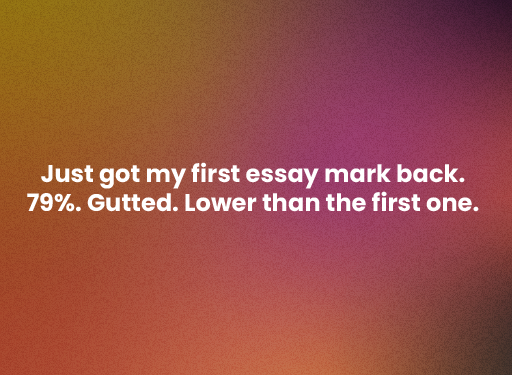1.3 Bragging or complaining about assessment results
One of the things that seems most divisive in social media posts are those in which students list the marks they have gained in either assessments or exams. These posts are particularly popular after the release of module results. Let’s consider how they might impact upon you as a student.
Activity 2 Students’ reactions
This image is based on one that was posted in a student led module Facebook page.
How do you feel about this student posting this message?
Discussion
Students’ reactions to this type of post vary massively. Some students will think 79% is an amazing result and be annoyed that this student is ‘gutted’. The student was considered by some to be ‘bragging’. However, others will understand the disappointment of not performing at a level that you want to perform at. Some of you will have no opinion at all and simply scroll past the post.
How you respond to marks that you gain at university will be affected by many things, including our goals, our past educational experience, or even personality traits we have. For example, some students have traits of perfectionism in their personality. In brief, people with this personality trait are driven to focus on their flaws, either through the self-belief that they are not perfect, or a belief that others expect them to be perfect.
What makes social media tricky to navigate is that is provides a public space for a greater number of people to compare marks. This may trigger things in us, including perfectionist tendencies where we unfavourably compare ourselves to others. Or raise the marks we expect of ourselves, creating disappointment in the scores we get.
Learning about how these posts can make us feel can be an important step in managing our response in social media. For example, knowing that you tend to be hard on yourselves or others might mean it is important for you to actively ignore these posts. We also need to be mindful of how we might make others feel with our posts and how a difference in the tone of the message can greatly improve responses.
Read the next post and consider how it varies from the post above.
I’ve been reading all of these wonderful stories and celebrating everyone’s successes with them but I now find I can’t feel the same level of joy or pride in myself & my results. I want to but I can’t!
I’ve gained a 2:2 BA hons, when I was honestly expecting a 2:1, I feel like I am just not good enough
At some level I pleased to have gotten through at all. I’ve had some tough times and it’s been a struggle so I should be wanting to shout it from the rooftops but I just can’t muster up the enthusiasm.. Is there anyone else who’s done amazing to just get through but just feels ‘flat’?
Comment
In this post you can see how the student is torn between wanting to celebrate her result and being disappointed by reading about others who are celebrating their marks. It is an example of how even happy posts on social media can impact deeply upon other students. However, the additional context in this post makes the reader more aware of where the feelings are coming from, this can help us to understand and comment in response in a way that is more helpful to the student and to ourselves. This student had a lot of positive comments as a result of her post.
In this case a lot of students commented on the post in support of her feelings. Unfortunately, this is not always the case, and the internet has a reputation for being a difficult space to be. You will cover this in the next section.

